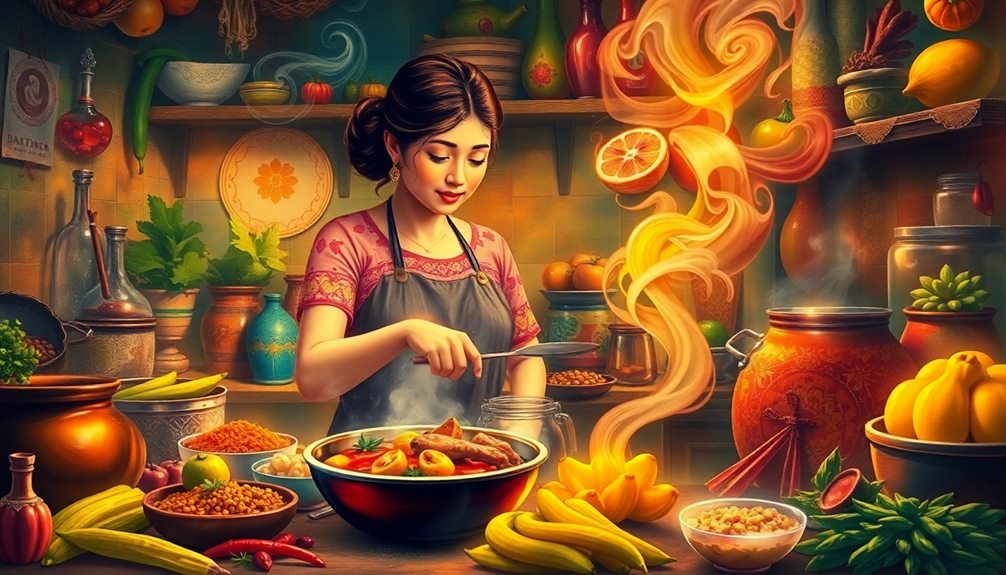"Like Water for Chocolate" tells the story of Tita, a young woman caught in oppressive family traditions. As the youngest daughter, she's forbidden to marry her true love, Pedro, which leads to heartache and longing. Each chapter features a recipe that reflects her emotions, blending magical realism with her culinary creations. Tita's cooking becomes her voice, expressing the passions and struggles she can't voice otherwise. The novel explores themes of love, loss, and the complexity of family ties, revealing how deeply intertwined food, culture, and emotion can be. Discover how Tita's story unfolds amidst these enchanting layers.
Overview of the Novel
"Like Water for Chocolate," an enchanting novel by Laura Esquivel, intertwines love, family, and tradition through magical realism. You immerse yourself in the life of Tita, the youngest daughter of the De La Garza family, who faces the oppressive family tradition that binds her to remain single while caring for her mother, Mama Elena.
This poignant story unfolds in monthly installments, each accompanied by a traditional Mexican recipe that mirrors the characters' emotions and events. Tita's journey symbolizes female empowerment and self-expression, highlighting her struggle against the constraints imposed by her family and society.
Tita's cooking serves as a powerful medium for expressing her feelings, allowing her to channel love and longing into the dishes she prepares. You witness how her emotions infuse the food, affecting everyone who consumes it, illustrating the profound connection between culinary art and emotional expression.
The narrative explores Tita's unfulfilled love for Pedro, who, compelled by societal expectations, marries her sister Rosaura to remain close to Tita. This forbidden love story paints a vivid picture of yearning and sacrifice, set against the backdrop of cultural traditions.
Through magical realism, Esquivel crafts a tale that resonates with the complexities of love, family dynamics, and the defiance of societal norms.
Themes of Love and Loss
In "Like Water for Chocolate," you see how love can transform lives, but it also comes with heavy consequences. Tita's forbidden love for Pedro not only shapes her journey but also reveals the deep scars left by maternal love and loss.
Much like the characters in *The Book Thief*, who endure immense challenges under oppressive regimes, Tita's struggles reflect the broader themes of resilience and defiance against societal constraints.
As you explore these themes, you'll uncover the profound impact they've on her quest for freedom and fulfillment.
Transformative Power of Love
Love in "Like Water for Chocolate" acts as a transformative force, reshaping the lives of its characters in profound ways. Tita's deep emotional connection with Pedro transcends societal norms, illustrating the transformative power of love. Despite the obstacles posed by family duty and societal expectations, Tita's love for Pedro remains steadfast, driving her actions and decisions throughout the story.
Tita's cooking serves as an emotional outlet, infusing her dishes with feelings of passion and sorrow. Each meal she prepares becomes a vessel for her emotions, affecting those who consume them, showcasing the magical realism that permeates the narrative. This connection between food and emotion highlights how love can transform not just individuals but entire experiences.
Moreover, maternal love emerges as a powerful force when Tita's nurturing instincts awaken with the birth of her child, Roberto. This generational love emphasizes the enduring impact of relationships and responsibilities.
As the climax unfolds in a volcanic eruption, it symbolizes the intensity of Tita and Pedro's love, reinforcing the idea that true love can persist even amidst loss and societal constraints. Through these elements, the novel reveals how love profoundly changes lives, binding characters in unexpected ways.
Forbidden Love's Consequences
The consequences of forbidden love manifest vividly in Tita and Pedro's tumultuous relationship. Tita's love for Pedro endures despite societal and familial constraints, leading to profound emotional turmoil and unfulfilled desires. Their bond is further complicated by Pedro's marriage to Tita's sister, Rosaura, which breeds jealousy and heartache.
You see how Tita's emotional state deeply influences her cooking; each dish she prepares channels her passion and pain, reflecting her inner struggles. This connection between love and food serves as a powerful metaphor for her unexpressed feelings.
The theme of personal sacrifice is prominent in Tita's life. You witness how she continually puts Pedro's happiness above her own, facing the agony of her situation with resilience. Tita's commitment to love is both beautiful and tragic, showcasing the lengths she goes to for an emotional connection that society deems unacceptable.
Ultimately, the culmination of Tita and Pedro's love story, marked by their tragic deaths, symbolizes the devastating nature of forbidden love. Their bond is transformative yet heartbreaking, leaving you to ponder the true cost of love when it defies societal boundaries.
Maternal Love's Enduring Impact
Maternal love weaves through "Like Water for Chocolate" as a powerful force that shapes Tita's identity and choices. Tita shares a deep emotional connection with Nacha, her mother figure, who nurtures her through the art of cooking. This connection becomes a guiding presence in Tita's life, influencing her decisions and actions.
When Tita becomes a mother to Roberto, her own maternal instincts awaken, revealing the transformative power of love that transcends biological ties.
Nacha's ghost symbolizes the enduring impact of maternal love, continuing to influence Tita's life long after her physical presence is gone. This haunting connection underscores the lasting bond between mother and daughter, even in the face of loss.
Tita's cooking serves as a medium for expressing both love and grief, reflecting the complexities of maternal bonds, particularly during emotional turmoil.
As Tita navigates her journey, the absence of Nacha's guidance weighs heavily on her, intertwining the theme of maternal love with the exploration of loss. Through these experiences, you see how maternal love shapes Tita's identity and underscores the profound impact it has, both in joy and heartache.
Magical Realism Elements

Magical realism weaves through "Like Water for Chocolate," creating a vivid landscape where Tita's emotions transform everyday cooking into extraordinary experiences. As you immerse yourself in the story, you see how Tita's feelings directly affect the dishes she prepares, making them almost magical. For instance, when she's heartbroken, her mole induces tears in those who taste it, amplifying their sorrow. This connection between Tita's emotions and her food illustrates how deeply intertwined her internal struggles are with her culinary creations.
The themes of resilience and personal growth, similar to those found in works like the inspiring journey from homelessness to fulfillment, resonate throughout Tita's experiences in the kitchen.
The novel showcases surreal events, like a character spontaneously combusting from passion, which emphasizes the fusion of the magical and the mundane. Tita's cooking acts as a conduit for her suppressed desires, allowing her emotions to manifest vividly in the flavors and outcomes of her dishes.
The integration of Mexican folklore and Indigenous storytelling enhances the emotional journeys of the characters, making their experiences richer and more relatable.
Ultimately, the magical realism in this narrative deepens your understanding of Tita's internal battles, highlighting the transformative power of love and connection through food. You'll find that each meal isn't just a dish but a story filled with emotions and magic.
Key Character Relationships
In "Like Water for Chocolate," Tita and Pedro's intense love story is overshadowed by family dynamics that create significant conflict.
The complexities of immigrant experiences, much like those faced by characters in other narratives, create layers of emotional depth and societal challenges.
You'll see how Rosaura's marriage to Pedro complicates Tita's feelings, pitting sister against sister under the weight of tradition.
Meanwhile, Mama Elena's strict adherence to familial duties shapes Tita's life choices, illustrating the powerful influence of maternal guidance. immigrant experience
Tita and Pedro's Love
Tita and Pedro's love story is a powerful demonstration to the struggle between desire and duty. Their deep, passionate connection defies the constraints imposed by family tradition, which cruelly forbids Tita from marrying due to her role as caretaker. When Pedro marries Tita's sister, Rosaura, he does so to remain close to Tita while conforming to societal expectations, complicating their love further.
Tita's emotional turmoil spills into her cooking, transforming her dishes into expressions of her feelings for Pedro. Each meal becomes a magical realism moment, affecting everyone who eats it, often reflecting her heartache and longing. Through these culinary creations, you see how Tita's love for Pedro symbolizes her yearning for personal freedom and fulfillment, a stark contrast to the societal obligations that bind her.
Ultimately, the bond between Tita and Pedro transcends physical separation. Their transformative reunion highlights the enduring power of their true love, illustrating that no matter the obstacles, love persists.
This poignant narrative captures the essence of their relationship, showcasing how love can flourish even in the face of overwhelming adversity.
Family Dynamics and Conflicts
The love story between Tita and Pedro unfolds against a backdrop of complex family dynamics that shape their lives. Tita finds herself trapped by her mother, Mama Elena, who enforces a family tradition that forbids her from marrying. This oppressive rule leads to deep emotional turmoil, especially since Pedro marries her sister, Rosaura, intensifying the conflict between the sisters.
Rosaura, who strictly upholds these traditions, embodies the struggle Tita faces, as both women love the same man. While Tita yearns for freedom and love, Mama Elena's rigidity clashes with her emerging identity, highlighting generational struggles within their family.
In contrast, Gertrudis, Tita's sister, represents rebellion against these stifling family dynamics, choosing to pursue her own desires, thereby challenging the status quo.
Amidst this turmoil, Tita finds solace in her nurturing relationship with Nacha, the house cook, who offers emotional support. This bond becomes essential as Tita navigates the complexities of love and familial obligation.
Ultimately, these key character relationships reveal the intricate web of loyalty, desire, and conflict that defines Tita's journey.
Maternal Influence and Guidance
Maternal influence shapes Tita's journey in profound ways, revealing the complexities of love, tradition, and rebellion. Tita finds emotional support in her nurturing relationship with Nacha, the house cook, who imparts culinary knowledge that helps Tita express herself through food.
However, Mama Elena's strict adherence to family traditions complicates Tita's life, creating emotional estrangement and stifling her ability to form romantic connections. This tension between tradition and desire leaves Tita feeling trapped.
In contrast, Gertrudis serves as a beacon of empowerment, encouraging Tita to embrace her true desires and challenge oppressive familial expectations. Their relationship highlights the duality of maternal influence—one that constrains and one that liberates.
When Tita holds her child, Roberto, her maternal instincts are awakened, demonstrating the transformative power of love that transcends societal norms.
Even after death, Nacha's spirit continues to guide Tita, emphasizing the lasting impact of maternal influence. This connection reinforces the theme of emotional support, showing that maternal figures can shape not just identities, but also the paths one takes in life.
Tita's journey encapsulates the intricate dance between loyalty to family traditions and the pursuit of personal freedom.
The Role of Food

Food plays a central role in "Like Water for Chocolate," acting as a conduit for Tita's emotions and experiences. Each dish she prepares is infused with her feelings, transforming simple ingredients into profound expressions of love, longing, and rebellion. When Tita cooks, she channels her innermost thoughts, and this connection is palpable to those who consume her food. This mirrors the way unique narratives in science can spark curiosity and deepen understanding, as seen in captivating science stories that blend storytelling with exploration.
The novel introduces each chapter with a traditional Mexican recipe, weaving culinary art into the narrative. Tita's Christmas Roll, for instance, evokes intense memories, causing her guests to weep uncontrollably. This illustrates how deeply her emotions impact the food she prepares.
Cooking becomes Tita's form of rebellion, allowing her to assert her identity in a family that restricts her desires. Through her culinary skills, she not only expresses her own journey but also connects with her family's history and traditions.
The act of cooking serves as a way for Tita to navigate her confined existence, ultimately demonstrating the profound significance of food in expressing emotions and forging connections in her life. Each dish tells a story, making food an essential element in Tita's magical love story.
Cultural Significance and Legacy
Celebrated as a cornerstone of Latin American literature, "Like Water for Chocolate" dives deep into the intricate ties between love, food, and tradition within Mexican culture. This novel not only showcases traditional Mexican recipes but also serves as a crucial cultural representation, preserving culinary heritage for generations to come.
Through Laura Esquivel's masterful blend of magical realism and feminist themes, you find yourself challenged to rethink gender roles and personal autonomy in a patriarchal society. Additionally, the themes of healing and empowerment resonate with those who've faced adversities, paralleling the stories of resilience found in Unbreakable Non-Fiction Tales of Survival and Hope.
The emotional connections forged through cooking highlight how food transcends mere sustenance; it becomes a medium for expressing love and identity. Readers see characters channel their feelings into dishes, creating a tangible bond between nourishment and sentiment. This exploration resonates across cultures, enriching your understanding of how culinary practices shape interpersonal relationships.
Moreover, the adaptation of "Like Water for Chocolate" into film and stage productions has broadened its cultural impact, making it accessible to diverse audiences. Each adaptation sparks ongoing dialogue about its core themes, ensuring that its legacy endures.
As you engage with this story, you appreciate its profound significance in the landscape of literature and cultural discourse.
Conclusion
In "Like Water for Chocolate," you discover a world where love and food intertwine, creating an unforgettable tale. Did you know that over 50% of readers say they feel more connected to a story when food plays a significant role? This highlights how the novel's rich culinary elements enhance emotional depth, allowing you to experience Tita's joys and sorrows on a profound level. Ultimately, you're left with a lingering taste of love's bittersweet complexities.



